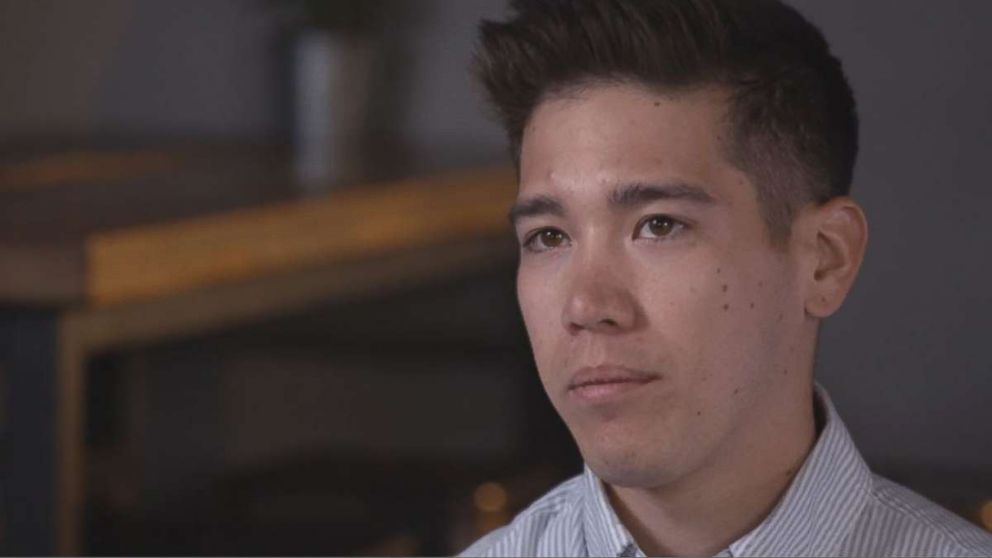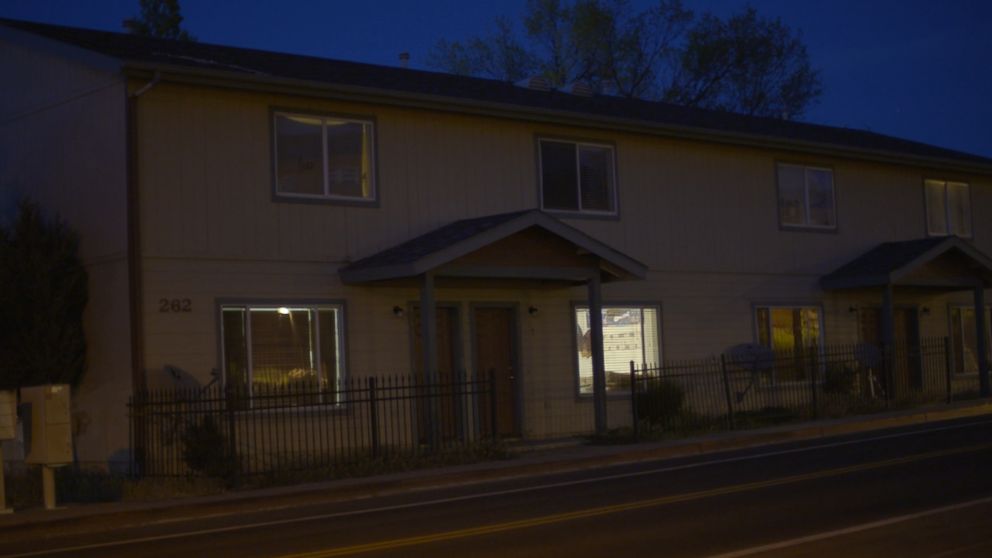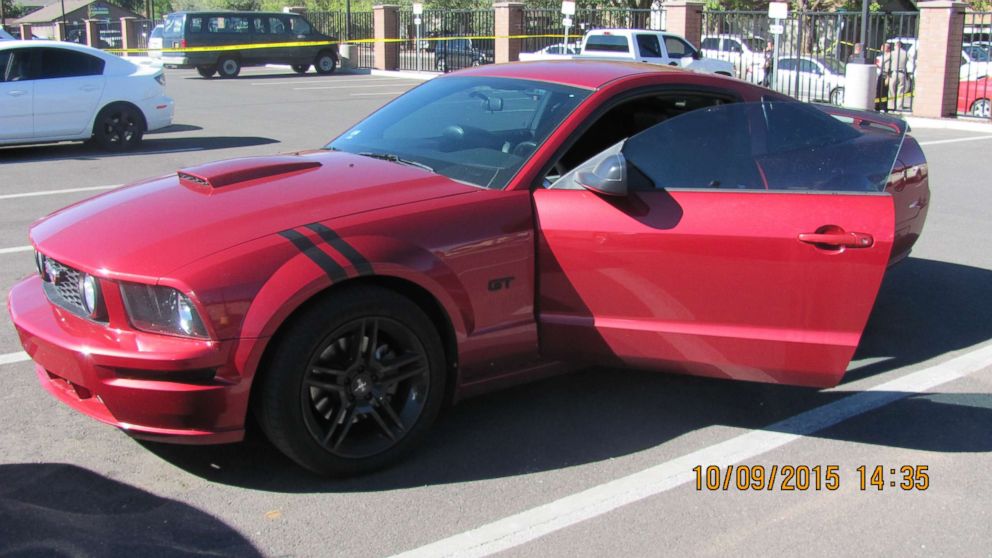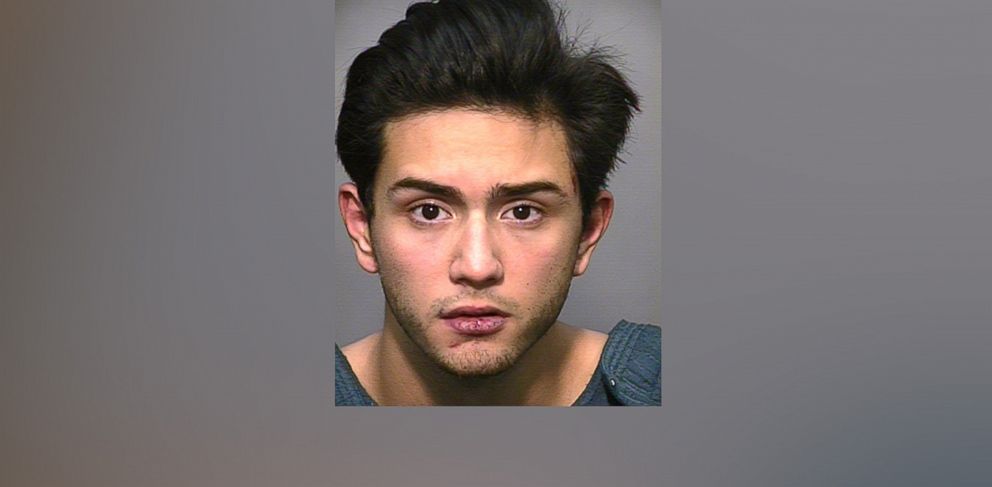Shooting outside of college party leaves 1 student dead, another facing murder charges, many questions about what happened
The night of Oct. 8, 2015 at Northern Arizona University began like many others.
— -- The night of Oct. 8, 2015 started out like so many others at Northern Arizona University -- with a party at the off-campus apartment complex known as "The Courtyard," popular among fraternity members of Delta Chi.
Except that night, for the first time in the college’s then-116-year history, there was a shooting.
The incident left one student dead, three others severely injured and another student facing first-degree murder charges.
On that October night, NAU student Nick Piring said he and his friend Colin Brough, a 20-year-old junior from Colorado, were hanging out and drinking with other members of their Delta Chi fraternity at an apartment in "The Courtyard." Around 1 a.m., on Oct. 9, 2015, Piring, fellow fraternity members Kyle Zientek and Zach Volpo, and several others, said they heard what sounded like an argument and went outside.
"There was a verbal confrontation going on in the street," Volpo said. "All of the sudden I see the group move into the parking lot. ... That’s when I saw the flashlight flick on.
"I said, ‘Alright, well whatever’s going on over there, it’s going to get taken care of, it's all done,’” Volpo added. “All of sudden, I hear three, four, really loud bangs."
Volpo said he then ran to the parking lot on campus, which was across the street from “The Courtyard," and found Brough and Piring lying on the ground, bleeding. They had both been shot twice.
"I was in so much shock, I had no idea," Piring said. "I saw a puddle of blood next to me and I realized I was shot.'"
Volpo said the only person he didn’t recognize in the parking lot was the young man still standing. It was Steven Jones, then an 18-year-old freshman.
"I realized that he was the gunman," Volpo said. "[I] immediately turned around, book it back, try to find some cover."
Witnesses say Jones fired off several more rounds, hitting Zientek and another Delta Chi member, Nick Prato.
Miqui Scollard, then a sophomore at NAU, was in bed in a dormitory that overlooks the parking lot when she heard the gunshots. She said she immediately ran downstairs to the parking lot, which had erupted in chaos.
"The first person I see is Nick [Piring]," she said. "He's laying here and I remember saying, 'Where are you hit?' Like, 'Where are you hurting?" and he's like, 'My shoulder.' ... I see his shirt and he's got a pretty big bullet wound there so I put my left palm on his shoulder.
"And before you know it, there was more and more gunshots," Scollard continued. "I remember looking to my left and the boys that I now know from the shooting were screaming, 'Stop shooting, stop shooting.' I remember one saying, 'He dropped the gun, he dropped the gun.' ... Before you knew it, we had officers on all of us with guns in our faces."
NAU police had arrived on the scene. In video footage from police body cameras obtained by ABC News' "20/20," an officer handcuffed Jones, who immediately identified himself as the shooter and appeared extremely distraught. An officer asked Jones over and over if there were any other active shooters in the area.
"No, nobody but me. I take all responsibility," Jones told the officer, and started repeatedly asking for his mother and pleaded for officers to help those he had shot.
"I’m so scared," Jones told the officer. "Can I call my mom?"
As paramedics arrived and began working on the four wounded students lying on the ground, Piring said he looked over to try to see if his friend Brough was still alive.
"I could just see Colin in the rocks at that point and [he’s] just unconscious," Piring said. "I remember them [the paramedics] putting like a blanket on top of him and I knew that he was gone."

A few hours later, around 6:30 a.m., Brough’s parents, Doug and Claudia Brough, got word there had been a shooting at NAU. The first thing Doug Brough said he did was text his son, Colin, who didn’t answer. Then he called the Flagstaff Police Department.
"They said the NAU police were handling it," Doug Brough said. "So I got the NAU person that was handling it and she told me Colin had passed."
"It was just like a bad dream," Claudia Brough said. "I kept thinking, 'This isn't real, this isn't -- this can't be,' ... Everything stops around you. Everything."
Jones had been on campus for less than a month when he opened fire on his fellow students. At his trial, prosecutors called him "an assassin in the night," but when police arrested and questioned him that day, Jones claimed he had feared for his life and acted in self-defense. Jones, his family and his attorney declined to speak with "20/20."
According to his videotaped police interrogation, Jones says on the night of the shooting he parked his car at the on-campus parking lot and walked, with three of his friends, fellow freshmen and Sigma Chi fraternity pledges Jacob Mike, Shay McConnell and Hunter Todd, to a gathering at the Grove Apartments off-campus.
Jones, along with Mike and McConnell who testified in court, said they left the Grove Apartments around 12:30 a.m. on Oct. 9, and were walking back to Jones’ car when they realized they had lost track of Todd.
Jones, Mike and McConnell said they were standing outside The Courtyard and could hear a party going on inside one of the apartments. In his testimony at trial, Mike said he knocked on the apartment door to see if Todd had gone into the party.

Giving up on Todd, the three freshman -- Jones, Mike and McConnell – then said they turned to head toward the parking lot where Jones’ car was, but then the apartment door opened.
What happened next remains in dispute.
The three freshman claimed a group of drunk fraternity members came out of the apartment, cursing and yelling at them to get away. Jones said they were trying to leave when someone came up and punched him in the face, knocking his glasses off and knocking him to the ground.
Jones told police he then made a run for his car. He says that although he was able to use his key fob to open the car doors, he was unable to find the key to start the car. According to Jones, two drunk fraternity members chased after him and he felt he had only one option to defend himself -- to reach into his glove compartment and pull out his .40-caliber Glock 22 with 17 rounds loaded in the magazine.
Jones had grown up with guns. Raised in Glendale, a suburb of Phoenix, he is an only child and was homeschooled by his mother. Jones told police his father, a former Navy service member and a National Rifle Association certified instructor, taught him the basics of shooting and self-protection starting when Jones was 8 years old. Growing up, Jones hunted, shot sport pistol competitions with his father, and he brought his gun with him when he moved to NAU.
The laws pertaining to guns on college campuses vary from state to state. In Arizona, the Board of Regents sets the guidelines, which state that no concealed weapons are permitted anywhere on college campuses. However, there is one exception written into the state law which supersedes the Board of Regents guidelines -- guns can be legally stored in locked vehicles on campus, like Jones' gun was.
To find out more about gun policies on college campuses across the country, CLICK HERE.
When Jones stepped out of his car that night with his gun in hand to confront the two drunk men, he told police he was terrified and was only thinking about the training he received from his father. Even before getting out, Jones claimed he yelled to the two men that he had a gun.
Jones said he walked a few steps and once again yelled to two men in front of him, "Don’t f---ing move. I have a gun, stop right there." That's when he said he heard one of the men say, "I’m going to kill you." Then Jones said the two men charged at him and he started firing. He told police his father trained him to fire his gun to stop a threat, to "fire until you are not in danger."
Piring told police that he ran over to aid Brough, but said he never saw Brough charge at Jones.

Jones shot Colin Brough in the chest and the shoulder. He shot Nick Piring in the shoulder and the hip.
Jones told police that after he shot Brough and Piring, he tucked his gun into his waistband and attempted to perform first aid on Brough. That's when he claimed he felt someone try to grab his gun and someone else put him in a chokehold. There were people screaming at him, Jones said, saying they were going to kill him for shooting their friend.
Jones told police he struggled for his gun, grabbed it and fired it into the air several more times, saying it was his attempt to scare away the men who were on top of him. In doing that, Jones shot Nick Prato once in the neck and Kyle Zientek twice in the back.
All told, Jones fired 10 shots with seven bullets hitting Delta Chi fraternity members.

Jones, now 20, was charged with first-degree murder for shooting and killing Brough and charged with several counts of aggravated assault for shooting Piring, Prato and Zientek.
Toxicology tests performed after the shooting found that Brough had a blood alcohol content of .285 -- three and a half times the legal limit. He also tested positive for marijuana and Xanax. Tests showed that the other three shooting victims -- Piring, Prato and Zientek -- were also significantly intoxicated.
Jones, whose tests showed he had no alcohol or drugs in his system that night, appeared to have several injuries consistent with being attacked -– including a bloodied face.
The case went to trial on April 5 of this year at the Coconino County courthouse in Flagstaff. Prosecutor Ammon Barker insisted this case was not about self-defense, but Jones getting retribution for being punched in the face.
By the end, 38 witnesses took the stand, including several Delta Chi members and Jones’ friends Mike and McConnell. Most of the witnesses were college students and almost all of them gave slightly different accounts of what happened that night. Even the most basic details, like how many Delta Chi fraternity members were involved in the scuffle that night, could not be agreed upon.
Mike testified he was pursued by five to seven men, whereas Jones put the number closer to 10 to 12. Not a single witness who testified said they heard Brough or Piring tell Jones, "I'm going to kill you."
The biggest contradiction was where the actual shooting occurred. Jones told police he was chased to his car and that after getting out with his gun he walked only "two or three feet" before Brough and Piring charged at him and he fired his gun. But the evidence showed that there was more than 90 feet between where Jones’ car was parked and where Brough lay dead.
At trial, Jones’ defense attorneys argued there were too many inconsistencies between the stories witnesses told police and what they said on the stand. His attorneys also argued that Jones waited until the last possible minute to use his gun and felt that if he hadn’t, he would have been killed and acted in self-defense.
On May 5, a jury of six men and six women announced to Judge Dan Slayton that they were deadlocked and Slayton declared a mistrial. On a day that was supposed to mean justice for her son, Brough’s mother said she was left in "disbelief."
"How could they [the jury] hear all the evidence and not come back with a guilty verdict?" Claudia Brough said.
Juror Robert Nagle told "20/20" in an exclusive interview that on their first vote, most jurors believed Jones was guilty of a crime, but they couldn’t agree on what. Nagle said ultimately, two jurors had voted to convict Jones of first-degree murder, four were struggling with which charge to choose and six had voted to fully acquit him of all charges.
"When I asked the question, 'Hey, who would've shot these boys in this situation?' Four of us said we would," he said.
Nagle said he personally felt Jones had a right to protect himself once he heard Jones testify that Brough and Piring came toward him.
"Steven Jones had absolutely no choice but shoot Colin Brough," he said.
Prosecutors announced they plan to retry the case in October. Brough's parents, still hoping for justice, are determined to keep fighting for their son.
"I believe that justice will prevail," Claudia Brough said. "I believe in the end he [Jones] will go where he needs to go so this doesn't happen to anyone else."




